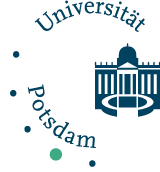Doctoral Researchers

Kai Harbrich
Master of Political Science, Law and Anthropology
Campus Griebnitzsee
DFG-Research Training Group "WIPCAD"
University of Potsdam
Department of Economics
and Social Sciences
August-Bebel-Straße 89
14482 Potsdam, Germany
Office: Campus Griebnitzsee, House 7,
Room 3.07.211-15
Research Topic
“Local Government Organizations as Partners in Global Climate Change”
Curriculum vitae
ACADEMIC EDUCATION AND WORK EXPERIENCE
10/2011 – 12/2011
Research Assistant, Chair of International Organizations and Public Policy, University of Potsdam, Germany
02/2010 – 05/2011
Research Assistant and Project Coordinator, Urban Times Research Initiative, Otto-Suhr-Institut für Politikwissenschaft, FU Berlin, Germany
10/2009 – 01/2010
Associate Lecturer, Geschwister-Scholl-Institut für Politikwissenschaft, LMU Munich and UniBw Munich, Germany
04/2009 – 09/2009
Lecturer, Chair of Global Governance and Public Policy, Geschwister-Scholl-Institut für Politikwissenschaft, LMU Munich
10/2006 – 09/2007
Tutor in International Relations, Geschwister-Scholl-Institut für Politikwissenschaft, LMU Munich
10/2001 – 03/2007
Magister (M.A.) in Political Science, Law and Anthropology, LMU Munich
Thesis: „Staatskonsolidierung vs. Staatszerfall. Eine vergleichende Untersuchung am Beispiel von Tanzania und Sierra Leone“
TEACHING EXPERIENCE
10/2009 – 01/2010
BA Seminar: „Wissenschaftliches Arbeiten für Studierende der Politikwissenschaft“ (Geschwister-Scholl-Institut für Politikwissenschaft, LMU Munich)
MA Seminar: “Neue Kriege” und Staatlichkeit im Zeitalter der Globalisierung. Theoretische Perspektiven und Anwendung am Beispiel Afrikas südlich der Sahara” (UniBW Munich)
04/2009 – 09/2009
BA Seminar: “Einführung in die Internationalen Beziehungen” (Geschwister-Scholl-Institut für Politikwissenschaft, LMU Munich)
CONFERENCE PAPERS
2012
“Regieren durch Orchestrieren. Neue lokale Handlungsspielräume für international Organisationen?”, Paper presented at the 10th IR Young Researcher Conference (“IB Nachwuchstagung”), 13-15 April 2012, Tutzing.
“The Concept of Orchestration. A Useful Tool for Analyzing Interorganizational Relations?”, Paper presented at the Expert Workshop “Inter-Organizationalism in International Relations. Theories and Cases”, Vesalius College & Institute for European Studies, Vrije Universiteit Brussel (VUB) and Global Governance Institute (GGI), 27-28 January 2012, Brussels.
2011
“UN Agencies as Managers of Local Change? Orchestrating Local Government Organizations” Paper presented at the 3rd “Offene Sektionstagung Internationale Politik” of the German Association for Political Science (DVPW), 6-7 October 2011, Munich.
„Transnational Municipal Networks and Global Climate Governance. From Technical Leadership to Normative Entrepreneurship?“, Paper presented at the 35th British International Studies Association (BISA) Conference, 27-29 April 2011, Manchester.
2008
„Selbstregulierung als Instrument der Institutionalisierung privater Sicherheit. Das Beispiel der International Peace Operations Association (IPOA)“, Paper presented at the Workshop “Legitimes Regieren jenseits des Nationalstaates”, Institut für Politikwissenschaft, Ernst-Moritz-Arndt-University Greifswald, 11-12 July 2008, Greifswald.
RESEARCH INTERESTS
- Authority and performance of International Organizations and Bureaucracies
- Alternative forms of international policy coordination and governance
- Transnational and local sustainability and climate protection standards
GRANTS
Short Term Scientific Mission via the COST Action: IS1207, Local Public Sector Reforms: An International Comparison (LocRef) from 22 April 2014 to 11 May 2014 at the Queen Mary University of London, United Kingdom.
Publications
2011
“Terrorismusforschung in Deutschland” (eds.), ZfAS Sonderband, Wiesbaden: VS Verlag (2011), [together with Alexander Spencer & Alexander Kocks].
2009
„Leerformel oder Leitbild? Zur Legitimität kollektiver Selbstregulierungsarrangements am Beispiel der International Peace Operations Association (IPOA)“, in: Take, Ingo (ed.): Legitimes Regieren jenseits des Nationalstaates. Unterschiedliche Formen von Global Governance im Vergleich, Schriften zur Governance-Forschung, Bd. 18, Baden-Baden: Nomos (2009), pp. 52-68.
“Global Security Governance without Government. Legitimität und Effektivität von Zertifizierungssystemen zur Regulierung globaler Rohstoffmärkte am Beispiel des Forest Stewardship Council (FSC)“, IR-Rookie Papers, no. 2 (2009), available online at: www.gsi.uni-muenchen.de/lehreinheiten/ls_ib/arbeitspapiere/hausarbeiten/harbrich_2009.pdf
2007
„Staatskonsolidierung vs. Staatszerfall. Eine vergleichende Untersuchung am Beispiel von Tanzania und Sierra Leone“, Arbeitspapier zu Problemen der internationalen Politik und Entwicklungsländerforschung, no. 47 (2007), available online at: gsi.uni-muenchen.de/forschung/forsch_zentr/publikationen/arbeitspapier/ap47.pdf
Abstract
Local Government Organizations as Partners of International Organizations
Building productive linkages between the Global and the Local Spheres of Climate Governance
In parallel with the ongoing inter-state negotiations under the aegis of the United Nations Framework Convention on Climate Change (UNFCCC), a large array of governance initiatives have been launched over the past years that involve actors from both the global and the local spheres of climate governance. Among them, in particular the manifold institutional linkages established between UN Agencies and Local Government Organizations (LGOs) have attracted growing attention among scholars and practitioners as part of a greater debate on how top-down and bottom-up approaches can be effectively combined in a post-2015 global climate regime. Yet while building such „global-local climate partnerships“ is increasingly considered as a promising governance tool to complement, or even reinvent, the mandates and operations of international organizations (IOs) and regimes, we still know only little about which actors are actually engaged, in what kind of cooperation, and why.
In order to provide an accurate and comprehensive picture of current collaborations and explain possible variations in the extent and shape of cooperation, the project assesses, in a first step, the extent to which IOs and LGOs are actually engaged in different forms of cooperation. Based on the findings of this comparative mapping, it then probes the explanatory power of a variety of institutional and organizational theories, among them resource dependence theory, sociological institutionalism, strategic management approaches and cultural-historical explanations. Finally, a more fine-grained resource-exchange model is proposed and tested against empirical evidence from a number of "most similar" cases in order to arrive at more general conclusions about the conditions under which IOs and LGOs are more likely to engage in varying forms of cooperation.
Data is gathered from official documents (e.g. mission statements, partnership agreements, program portfolios) and „grey literature“ published by the participating organizations, which is complemented by expert interviews with IO and LGO representatives responsible for managing their organizations‘ external relations and partnerships. Among the IOs and LGOs investigated in this project are those organizations deemed to be „focal“ in the area of climate change: the United Nations Environment Programme (UNEP), the United Nations Development Programme (UNDP), the World Bank Group, the C40 Cities Climate Leadership Group, ICLEI – Local Governments for Sustainability, and United Cities and Local Governments.
